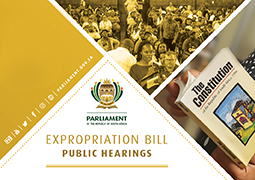
Parliament, Tuesday, 24 August 2021 – The Portfolio Committee on Public Works and Infrastructure has been urged by Khoi and San traditional leaders to expedite the Expropriation Bill to ensure that the nation directly benefits from land on which they were the first occupants. The committee was holding its third public hearings on the Expropriation Bill in Northern Cape, where the majority of people were not in favour of the bill.
Khoi-San traditional leaders emphasised that the return of land, which could be accelerated by adopting and implementing the bill, will open greater economic opportunities for their nation. Furthermore, they believe that it is only through the availability of land that they can practice and commodify their cultural practices, thereby increasing tourism, which will bring much-needed foreign spending to the municipality and create much-needed job opportunities.
Traditional leaders also highlighted that within the Gamagara Local Municipality two farms have ancient Khoi-San rock drillings that they are unable to benefit from. They also criticised their inability to directly benefit from mining ventures in the area, because their land was never restored to them.
Despite this, the majority view in Kathu leaned towards rejecting the Bill, while both views were critical of the incapacity of the state to deliver on promises made. Both sides agreed that municipalities are currently custodians of large tracks of land, which they said must be released for their benefit to unlock its economic potential, especially for an impoverished area like Kathu.
Those that opposed the bill highlighted that, in principle, they agreed on the need for land restitution, but they highlighted that the model adopted should not be detrimental to South Africa’s economic fortunes. The bill should also do what it can to encourage land productivity.
Many of those opposing the bill emphasised that it is unfair on those individuals who have worked their entire lives to purchase and improve property. This effort will now be at risk if the bill is adopted.
Many participants in the public hearings held a strong view that the bill is a smokescreen to benefit a few politically connected individuals and would exclude the poor majority. The plight of the poor, they said, will be exacerbated by food shortages and unemployment, and poverty will increase.
The committee appreciated the valuable contributions made by the public and highlighted that this process brought to life Section 59 of the Constitution, which compels Parliament to facilitate public involvement in the legislative and other processes of the National Assembly and its committees.
“With every public consultation process, we as Members of Parliament are empowered with information and lived experiences of the people of South Africa, which will assist us in drafting and adopting legislation that are responsive to the needs of the people. We also don’t take likely the willingness by the people to participate in these hearings, even though we continue to face tangible risk of Covid-19,” said Ms Nolitha Ntobongwana, the Chairperson of the committee.
The committee will conclude the Northern Cape leg of the public hearings in Kimberley at the Galeshewe Recreational Hall today.
ISSUED BY THE PARLIAMENTARY COMMUNICATION SERVICES ON BEHALF OF THE CHAIRPERSON OF THE PORTFOLIO COMMITTEE ON PUBLIC WORKS AND INFRASTRUCTURE, MS NOLITHA NTOBONGWANA
For media enquiries or interviews with the Chairperson, please contact the committee’s Media Officer:
Name: Malatswa Molepo (Mr)
Parliamentary Communication Services
Tel: 021 403 8438
Cell: 081 512 7920
E-mail: mmolepo@parliament.gov.za

